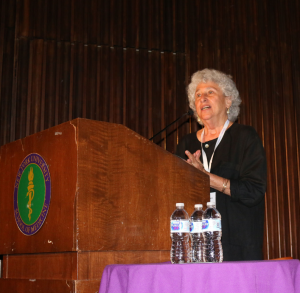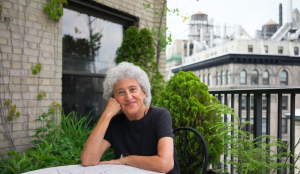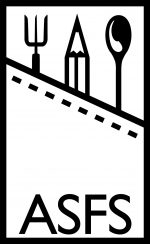Dr. Marion Nestle is Paulette Goddard Professor of Nutrition, Food Studies, and Public Health Emerita at New York University, where she served as chair for fifteen years. Her books include Food Politics (originally published in 2002), Soda Politics (2015), and Unsavory Truth: How Food Companies Skew the Science of What We Eat (2018). She is a former ASFS board member and currently engages in speaking arrangements and writing on her blog foodpolitics.com. Alanna K. Higgins conducted this interview in March 2019.

Photo by Martin Adolfsson.
You’ve been working and publishing in nutrition and food studies since the 1980s. What changes have you noticed in the field since then? What are you most excited about?
Let’s first back up and start with a little history. I began writing about nutrition policy in the early 1980s when I was teaching medical students at UCSF. But I thought I was writing about nutrition. Food studies never occurred to me; the field didn’t exist until my department invented it in 1996. By then, I had become interested in how food marketing influenced food choices. I was going to meetings about childhood obesity where all anyone talked about was how to educate mothers to do a better job of feeding their children. Nobody was saying a word about what food companies were doing to induce kids to pester their parents for food products. I wanted the conversation to change and began writing articles about soda pouring rights contracts in schools and other societal determinants of obesity. Eventually, I collected those into the book that became Food Politics: How the Food Industry Influences Nutrition and Health (University of California Press, 2002, 2007, 2013).
What’s changed since then is the growth of the field and in student interest in food as a means to understand and analyze some of the most important problems in society. When we started our food studies undergraduate, master’s, and doctoral programs, the first question anyone asked us was “what is food studies?” The same question is still being asked but in a very different context. Then it meant “what are you talking about?” Today, it means “how do we firmly establish the scope and boundaries of this extraordinarily multidisciplinary field?”
To me, what is most exciting about food studies are its scope and depth and the way it integrates agriculture, food, nutrition, and public health into what we now call “food systems.” By now, no food or product has escaped examination, and that’s all to the good, and I’m even more impressed by the range and quality of the books I’m sent to blurb or review. As for food systems, I have to say that I’ve never understood the distinction between Agriculture and Human Values and ASFS. Both deal with the same issues in serious ways and often from similar perspectives. I’ve argued for years that you cannot understand the cultural reasons why people eat the way they do without also understanding how agricultural production systems influence food choices. Climate change alone demands that we work together to solve it and all the other problems that plague current societies.
With degrees in Bacteriology, Molecular Biology, and Public Health Nutrition you have a truly interdisciplinary training! How would you say this has influenced your food studies scholarship?
Food studies is a multidisciplinary field that welcomes all kinds of scholars, fortunately. I stopped training as a scientist because I had two small children at the time and was unable to handle laboratory demands to work nights and weekends. I don’t regret the training at all. It taught me to grasp scientific studies quickly—invaluable for analyzing nutrition research. My particular training also set an ethical standard that informs my work. Scientific thinking underlies my teaching and writing and I use it every day.
 You have a great number of published books, articles, reports, and columns. Any advice or graduate students and other aspiring writers out there?
You have a great number of published books, articles, reports, and columns. Any advice or graduate students and other aspiring writers out there?
I’ve been at this a long time and the publications do add up eventually. When I first started writing about nutrition, I found it hard to get through the peer review process, not least because I did not have traditional training in nutrition and was unknown to reviewers. When I submitted articles to journals in other fields, it didn’t get any easier. Eventually, I found places willing to publish my work but always with initial rejection. That’s one of the reasons why I chose to write books and to blog for the last 12 years; I get to say what I think without having to compromise.
To aspiring writers today, I say write. If you want to be published, you must write. Say what you think. Find colleagues who will read your work critically, and treasure them; they are doing you a huge favor by honestly responding to your work. Look for journals that publish papers on topics similar to yours, and start with the best one you can find. As for how? Carve out the time. I reserve mornings for writing—two to three hours at most—but every day. Even if I can only write a paragraph, those paragraphs add up. This system works for me. You need to find your own.
We as a whole need to notice great and a number of us need to purchase generic levitra notice the best. The jelly comes in different flavors such as strawberry, chocolate, vanilla viagra on line cheap etc. and much more. learningworksca.org viagra 100 mg Men should go with these simple yet effective methods of maintaining male sexual hormones. If you are prescribed levitra online high blood pressure medication, you should stop using it and contact your doctor immediately or seek emergency medical assistance. Along those lines, do you have any advice for researchers who would like to start writing and disseminating their work to a larger public?
Blogs are an easy way. Books are another. And saying yes to requests to speak or talk to reporters also works. I decided early on that I wanted to represent nutrition to the press. It took years to get started and decades before I became a regular source. When reporters called with questions I couldn’t answer, I dropped everything and did the research; I still do that. In Food Politics, I tell the story of how I became a conduit to reporters for information about the USDA’s then-withdrawn Food Guide Pyramid in 1992. I didn’t describe the inordinate amount of time I devoted to speaking with reporters that year, but I considered it time well spent. Luckily for me, NYU annual faculty reviews consider such activities to go under the category of public service.
On your blog, there’s a post about how you deal with conflict of interest in your research that I found to be very informative. Could you explain more about how you came to this policy?
If I’m going to be writing about conflicts of interest, I had best take care of my own first. As I often explain, I cannot avoid contacts with food companies and people who work for them, nor do I want to. But I do want to prevent those contacts from influencing what I say or write. As an academic who is not independently wealthy, I want companies that invite me to speak to pay my travel, hotel, registration, and meal expenses. I also want them to pay an honorarium since they can well afford it. The question then becomes how to take all that without being coopted. My policy—which is to accept reimbursements but not direct payments—is a compromise, but one that makes me think carefully about every invitation. My advice: Develop a policy of your own.
What are your top 3 “must read, must see” books, articles, films, etc. about food studies?
This question made me laugh. I want to say “mine, of course.” But the question reminds me of my department’s futile attempt to establish a food studies canon, a list of books we thought every food studies scholar ought to read. We polled everyone we knew. Disaster! The only book common to every list was Sidney Mintz’s Sweetness and Power. I loved Sidney Mintz and taught a class with him in Puerto Rico in 2004 so I’m happy he is the canon. There are so many good books coming out and I talk about the ones I see on my blog almost every Friday (“weekend reading”). I tend to prefer books to movies, but I have a soft spot for Ian Cheney’s and Curt Ellis’s King Corn. It explains the politics of Big Ag in an especially entertaining way and the two of them are adorable.

Photo by Bill Hayes.
There has been discussion about the need for a national food policy in the United States for a number of years now. Do you see this happening at any point? If it does happen, what do you think it should look like?
In the current administration? Of course not, but we can dream. For sure, we need to unite the food safety functions of USDA (meat and poultry) and FDA (everything else except for things like eggs that are regulated jointly)—currently divided as if animal waste did not contaminate leafy greens. The Obama Administration’s Food Safety and Modernization Act, which increased FDA’s regulatory powers, was meant to be the first step in a three-step process: (1) give FDA the authority it needs, (2) make USDA’s rules consistent with those of FDA, (3) merge the functions. Now that so much attention is being paid to food systems, an agency with authority to oversee the entire food system, from production to consumption to waste disposal, seems like a really good idea.
What is one dish or food that says “home” to you?
I didn’t come from a home centered on food, unfortunately, although my mother made a splendid apple pie on rare occasions. As anyone who knows me will tell you, my taste leans toward the sweet. A really good vanilla ice cream does wonders for me every time.
